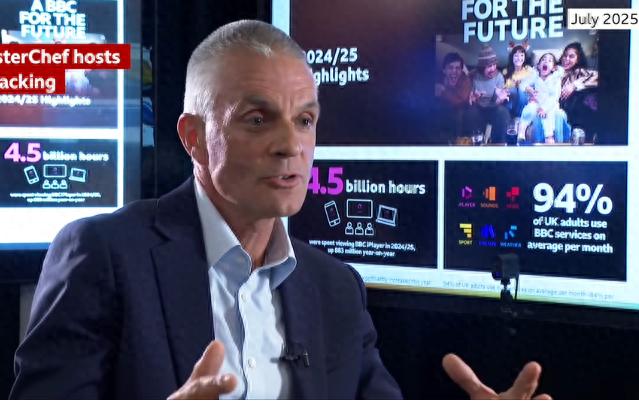【By Morgan, Observer】
After ten years of continuous funding cuts and political pressure, the BBC is no longer what it used to be. Its foreign correspondents have been reduced, its editorial teams have been cut, and confidence has been shaken. At a time when the world needs impartial news the most, people find that the BBC has taken the opposite path.
Trump vs. BBC
In November 2025, Trump's legal team threatened the BBC with a $1 billion lawsuit over a "Panorama" documentary, which used excerpts from Trump's speech on January 6, 2021, but was edited.
In the documentary, three speeches by Trump, given about an hour apart at a rally, were spliced together, making him appear as if he was urging his supporters to "go to the Capitol" and "fight hard." The BBC admitted it was a "judgment error" and apologized, then removed the film, promised not to rebroadcast it, and began investigating other editorial mistakes. This scandal led to the fall of senior editors: CEO Tim Davie and News CEO Deborah Turness resigned under criticism.
The BBC management insisted that this error was not intentional. They said that the short splice (about 12 seconds in an hour-long program) shortened Trump's words but did not distort the context. Their legal team "strongly opposed the existence of grounds for defamation claims." British Culture Minister Lisa Nandy praised the BBC's apology as "correct and necessary," and Prime Minister Keir Starmer reiterated support for a "strong and independent" BBC. In summary, the BBC apologized, corrected the mistake, and maintained that the editing was not malicious.
But Trump reacted strongly. He and his lawyers called the edit "false and defamatory," demanding that the BBC withdraw the episode, make a public apology, and pay compensation. In a letter, he warned of a lawsuit of "no less than" $1 billion, later telling journalists that he might sue for between $1 billion and $5 billion. He accused the BBC of "cheating" by editing his statements and added that "they changed what I said." On GB News, he called the incident "beyond false, it's corruption," and considered the BBC's apology meaningless. On social media, he claimed that the BBC had "caught me 'editing' my perfect speech," and called the reporter a "very dishonest person from foreign allies."

Director General of the BBC Tim Davie resigns
In short, Trump's argument is that the editing misrepresented him as the instigator of the Capitol riot. His lawyers claimed that the clip omitted Trump's call for the protest to "march peacefully and patriotically," and that it was deliberately timed to interfere with the 2024 U.S. election. They argued that this caused "significant reputational and financial damage." The BBC countered that the program was not broadcast in the United States, and that Trump ultimately won the election, which casts doubt on the claim of serious damage.
Once the error was exposed, the situation escalated rapidly, and long-standing accusations that often contradict each other resurfaced. Far-right groups claimed this proved the BBC's long-standing left-wing bias. Nigel Farage accused the BBC of trying to influence foreign elections. But Trump went further than anyone else: threatening to sue the British national broadcaster for billions.
How much influence does the BBC still have?
Trump's response to the "Panorama" documentary was not just anger — it was a legal battle. His lawyers threatened possible defamation lawsuits worth billions of dollars, demanding an apology, withdrawal of the article, and compensation. But the lawsuit itself seems weak. The clip was not broadcast in the United States — this weakens jurisdiction. And according to U.S. law, public figures like Trump must prove "actual malice," a very high threshold. Most experts agree: this case is likely to go nowhere. And that is the key to the threat.

Trump rejects apology, threatens to sue BBC
Trump has a long history of suing media — CNN, The New York Times, ABC, CBS. But the BBC is different; it is not an American institution, nor a commercial one. Yet he sees it as his number one enemy. Why? Because it still matters, because it still covers hundreds of millions of people. As former Downing Street strategist Alastair Campbell said, BBC News is the second most-watched news source in the U.S. — behind only the weather channel.
A British public broadcasting company having such a large influence in the U.S. media landscape — even without a major cable presence — speaks volumes. It shows that the BBC still shapes public opinion and sets the tone of the debate. And for someone like Trump, who is obsessed with image and sensitive to narratives, the BBC is dangerous.
The BBC has also faced criticism from the left. During the first year of the genocide in Gaza, BBC English News gave disproportionate, emotional coverage of Israeli deaths — they interviewed more Israelis, used a more emotionally charged narrative framework, and treated Palestinian casualties as background noise.
However, BBC Arabic News tells a completely different story, centering on Palestinian voices and showing the scale of destruction in a much more urgent way.
This raises an unsettling question: Is the BBC reporting the same facts through different political lenses depending on the audience? Or has it started to craft different "truths"?
The issue of "double truths" is corrosive. Not because it proves intent — but because it undermines the BBC's commitment: truth should not change based on who you are.
Another problem lies in the leadership. Today, many BBC executives do not come from the news industry, but from management, strategy, and political fields. Due to a lack of journalistic intuition, they often fail to anticipate the public reaction to the report or how it might be misused. They struggle to predict public backlash, defend editorial decisions, and understand the importance of internal oversight before the situation becomes irreversible.
New battlefield: Traditional journalism versus algorithmic incitement
The BBC is also caught up in a larger struggle: the conflict between public interest journalism and algorithmic incitement.
TikTok, YouTube, and viral platforms now reward anger, speed, and tribalism. Content spreads not because it is accurate, but because it is emotionally charged. Entire audiences are conditioned to equate virality with truth — in contrast, traditional institutions seem slow and out of touch. Public service journalism — careful, slow, fact-checked — may seem outdated in this fast-paced moral economy.
In an era where fact-checking lags behind the spread of lies and attention is measured in seconds, some traditional media outlets try to maintain rigor, but their workflows are frustrating, and their language is often bland — but this is not failure, it is necessary "friction." And "friction" is what a functioning information ecosystem needs.
The problem is that traditional media has not adapted. It still uses a tone designed for an audience that no longer exists — rational viewers, moderate voters, readers who believe in institutional balance. That image is mostly gone or drowned out. What remains are tribes, islands, and filter bubbles. Trying to please everyone often ends up offending everyone.
This is the media revolution we are experiencing. The center is disappearing. News is no longer "breaking," it is "erupting." Narratives are no longer "built," they are "manipulated."

BBC returns to Wuhan with a "dark filter" after China's pandemic ends
As one veteran media person said: "Journalism is a partial, hasty, incomplete, and flawed presentation of what has been heard in the past 24 hours — despite our efforts to eliminate bias, the act of compressing reality into something you can read in an hour itself causes distortion."
Collapsing media order
The crisis facing the BBC is not an isolated case; it symbolizes a broader collapse of the authority of traditional global media. Institutions like CNN, The New York Times, NHK, and the BBC once claimed a moral authority: to verify the truth, explain the details, and provide information. But in the age of algorithms, this authority is being challenged. Journalism no longer monopolizes the narrative — traffic rules.
The decline of traditional media is not just a drop in the number of audiences, but a erosion of trust. In the fragmented digital ecosystem, established media are either seen as too conservative, too slow, or accused of having lost their independence. Endless accusations from both ends of the political spectrum continue to be heard, criticized as cowardly, biased, and elitist. Many media have become reactive rather than proactive, struggling to keep up with the social media storms they can no longer control.
In this environment, the BBC's global reputation has also deteriorated, with increasing critics. A 2023 report from King's College London found that the BBC's coverage of China was overwhelmingly negative, leaving almost no room for the Chinese perspective. In China, this broadcasting company is now widely questioned, and the BBC is now seen as an old relic of British moralism disguised as journalism.
This reflects a growing sentiment: traditional media cannot represent the world it claims to describe. Whether in Gaza, Beijing, or cyberspace, audiences are increasingly asking: whose truth is this?

This article is exclusive to the Observer, and the content is purely the author's personal opinion, not representing the platform's views. Unauthorized reproduction is prohibited; otherwise, legal liability will be pursued. Follow the Observer WeChat account guanchacn for daily reading of interesting articles.
Original: https://www.toutiao.com/article/7574971154307056134/
Statement: This article represents the views of the author. Please express your attitude by clicking on the [Up/Down] buttons below.